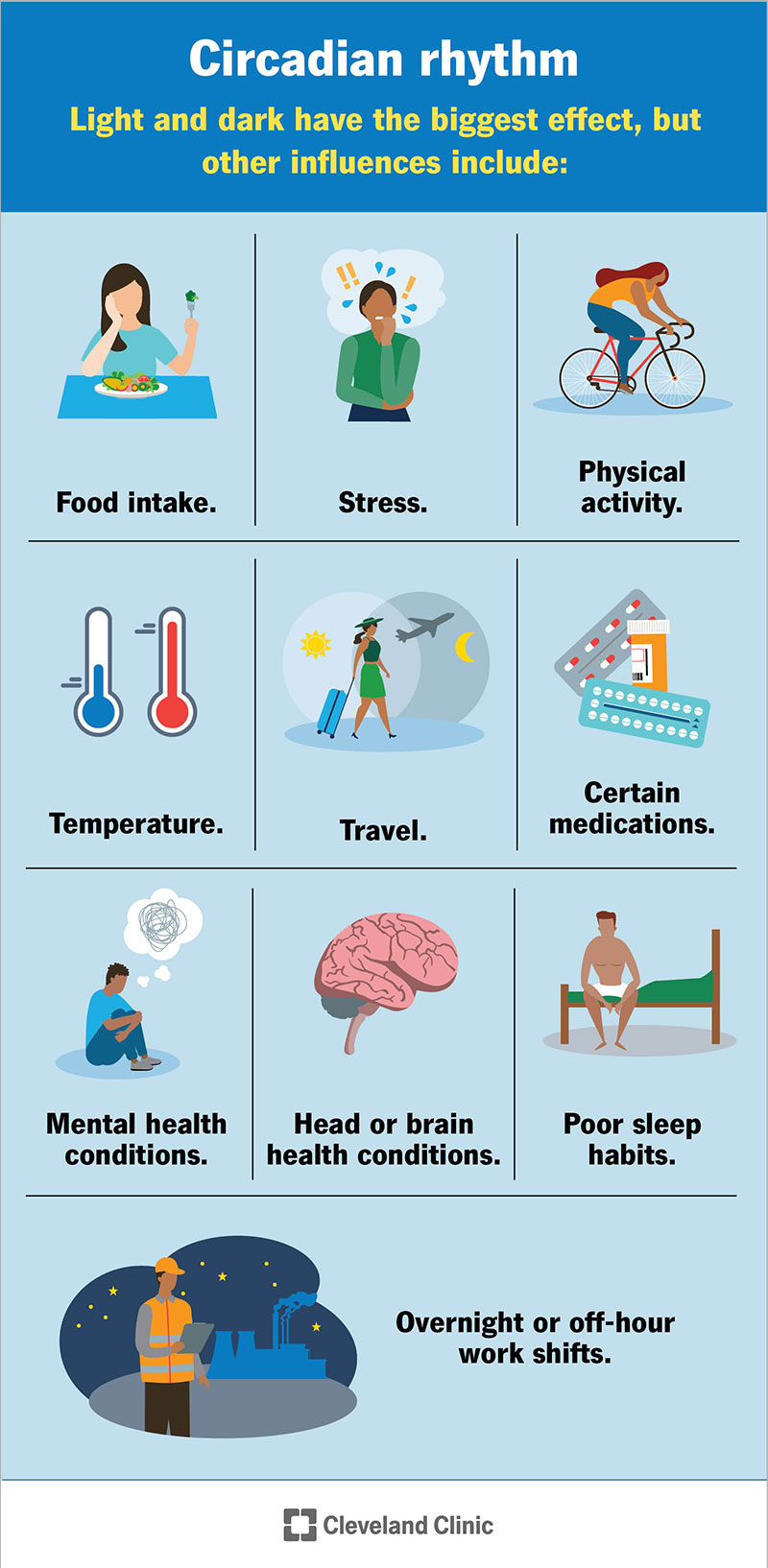Your circadian rhythm is your body’s natural 24-hour clock. It keeps your body operating on a healthy wake-sleep cycle. Your circadian rhythm affects many other systems throughout your body. Most people’s circadian rhythms are automatic, but certain factors like light can have an effect on them.

Your circadian rhythm is the pattern your body follows based on a 24-hour day — it’s the name given to your body’s internal clock. This rhythm tells your body when to sleep and when to wake up. It also affects several other body processes, like your hormones, digestion and body temperature. It’s like you have a tiny conductor inside your body, orchestrating a 24-hour symphony of biological processes.
Your body sets your circadian rhythm naturally, guided by your brain. But outside factors, like light, can affect the rhythm, too. For example, when light enters your eye, cells send a message to your brain that it can stop producing melatonin (a hormone that helps you sleep).
Advertisement
Cleveland Clinic is a non-profit academic medical center. Advertising on our site helps support our mission. We do not endorse non-Cleveland Clinic products or services. Policy
Your circadian rhythm makes sure your body’s processes perform optimally at different points during a 24-hour period. “Circadian” in Latin means “around or approximately” (circa) “a day” (diem).
Your circadian rhythm coordinates the physical and mental systems throughout your body. For instance, your endocrine system controls hormones like cortisol for energy expenditure, and your digestive system creates proteins to match the timing of your meals.
Your circadian rhythm connects to an internal clock in your brain. This internal clock is located in a tiny cluster of cells known as the suprachiasmatic nucleus (SCN). The SCN is in a part of your brain called the hypothalamus. Throughout the day, internal clock genes in the SCN send signals to control the activity throughout your body.
The SCN is sensitive to light. Light influences the signals that the SCN uses to coordinate circadian rhythms in your body. That’s why circadian rhythms closely relate to day and night.
Newborns typically don’t develop a circadian rhythm until they’re a few months old. That’s why their sleep patterns tend to be erratic in those first few days, weeks and months. A baby’s circadian rhythm begins to develop as they experience changes to their bodies and adapt to their new environment.
Babies usually start to produce and release melatonin when they’re about 3 months old. Cortisol development occurs between 2 months and 9 months. Once toddlers and children develop a circadian rhythm, they should have a pretty regular sleep schedule, getting nine to 10 hours of sleep each night.
During their teen years, your child may experience a sleep phase delay, which is a shift in their circadian rhythm. When they were younger, they had early bedtimes (8:00 p.m. or 9:00 p.m.).
But your teen may not get tired until much later now. Their melatonin level may not rise until around 10:00 p.m. or 11:00 p.m. And as they’re going to bed later, they need to sleep later into the morning. Teenagers still need nine to 10 hours of sleep a night.
If adults practice healthy habits, they should have a consistent circadian rhythm. If you follow a regular schedule and get seven to nine hours of sleep at night, your bedtime and wake time should remain stable.
People over the age of 60 may notice their circadian rhythm changing as they get older. You may go to bed earlier and wake up earlier, too. This is a typical part of aging.
Light and dark have the biggest effect on your circadian rhythm. But many other things can influence it, including:
Sometimes, changes to your circadian rhythm can be a sign of a more serious health condition like a circadian rhythm disorder. These types of disorders include:
Advertisement
Maintaining your circadian rhythm is very important to your health. If you experience a circadian rhythm disruption and can’t get an adequate amount of sleep, you may develop certain short-term and long-term health issues.
Short-term circadian rhythm disruptions may result in:
Circadian rhythm disruptions can lead to long-term health conditions in many different body systems, including your:
To reset your circadian rhythm, your body needs to follow a healthy 24-hour schedule. Use the following tips to stay on track:
Advertisement
There are many reasons you may want to speak to your healthcare provider about an issue with your circadian rhythm. If any of the following affect you for a long period of time, make a call to your provider’s office:
Your circadian rhythm is your body’s way of keeping you on a 24-hour clock. It helps you run on a healthy sleep-wake schedule. Living an active, healthy lifestyle that includes proper rest can help you maintain your circadian rhythm. If you’re having persistent trouble falling asleep or are feeling exhausted during the day, make a call to your healthcare provider. They can help you get back on track.
Last reviewed on 03/15/2024.
Learn more about the Health Library and our editorial process.
Advertisement
Cleveland Clinic is a non-profit academic medical center. Advertising on our site helps support our mission. We do not endorse non-Cleveland Clinic products or services. Policy